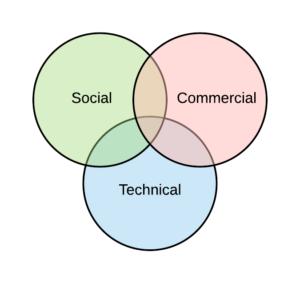Delivering projects is a human activity. Generating something new from ‘thin air’ requires groups of people who are able to conceive, plan and then execute a series of complicated activities that will, in some form or other, enhance the lives of other human beings. Large projects require the input of many highly specialised skills, which are of limited value in themselves, but are of significant worth when combined with the skills of others. It is this combination of applied skills that lead to success. Project teams need intelligence, or more particularly three distinct types of intelligence.

- Technical intelligence – the knowledge and awareness of how to find the solution to a particular problem or opportunity.
- Commercial intelligence – the knowledge and awareness of issues around money, contracts and the identification and management of risk.
- Social intelligence – the knowledge and awareness of how humans behave in groups and teams.
Large projects require lots of people. Despite advances in automation, we remain a long way from having robots to design, manage and deliver complex engineering software, logistics or construction projects. These enterprises require human expertise and ingenuity to make them happen. As illustrated in the diagram below, there is a sweet spot at the centre of the Venn diagram where these three elements combine to form the rounded capability to lead and manage a major project. When assembling a project team, we tend to value specialist technical and commercial skills in others because they cover for gaps in our own skill or knowledge set. Adding social intelligence to the group, however, tends to be seen as much less important.
Social intelligence
We often use the word ‘dynamics’ to describe how people interact when they are together in a group or team. The word dynamics actually means ‘forces of change’. We tend to use the phrase ‘human dynamics’ when talking about how people interrelate when they come together as a group or a team. So human dynamics are essentially the forces that create or destroy the momentum of interaction between groups of individuals.
The problem is that people are messy. Humans are driven by a complex series of emotional reactions that are genetically hardwired into us to thrive and survive. Our behaviours are driven by motivational factors that are often not visible to others and can often be difficult for others to comprehend. To understand others and then have them understand you is an essential human skill. The ability to first understand others and then be understood by them is often referred to as Social Intelligence. This is a term used to describe a degree of awareness of the human interactions between oneself and others and also between others.
The concept of Social Intelligence has a variety of possible definitions but at its simplest, it is ‘an ability to get along well with others and to get them to co-operate with you’ . Daniel Goleman (2006) argues that whilst IQ is something that you are born with, social intelligence is regarded more as a learned skill, than a genetic trait. This leads us to the question that if social intelligence is an essential component of project success, then why do professional bodies pay so little attention to its development?
My observation is that there tends to be a tacit assumption in many teams that everyone on the team will automatically have the social skills needed to get along well with each other. This often turns out to be a significant misjudgement. Whilst humans have evolved to work in groups, left to our own devices we also have an amazing capacity to find reasons to disagree and dislike other people or groups. As projects have got bigger and more complex, it is clear that future generations of project leaders are going to have to take the development of their social intelligence more seriously.
Positive social interaction in project teams cannot therefore be left to chance. In just the same way as the technical and commercial competencies, there are methodologies for building strong social bonds. Those methodologies need to first be understood, learned and then practiced.
Learning and development
So if Social Intelligence is a learned skill set, the next question is how and where to acquire it.
The prevailing belief in universities and colleges appears to be that the development of social skills should be left to future employers. The problem in deferring the development of these skills is that too much effort is spent in remediating bad habits and rebuilding confidence, rather than providing the more advanced social competences needed to help individuals and teams thrive in a complex environment. It is interesting to note the outcome of a survey of teachers, reported in an article in the Times Literary Supplement dated 30 August 2017. The article highlighted the statistic that 91 per cent of respondents felt that schools should be doing more to help their pupils develop teamwork and communications skills.
There is a tendency to call the ability to understand and communicate a ‘soft’ skill, the implication being that learning how to connect with other people is an imprecise art rather than a precise process. I believe this is an outdated description emanating from a time when managers lacked both the knowledge and the need to recognise the practice and process of efficient and effective team development. The other argument for degrading social skills to the category of ‘soft’ is a belief that they cannot be measured and therefore cannot be managed. This again is simply lazy thinking. There is no difference in my mind in assessing someone’s technical, commercial or social capabilities. It is simply a matter of choosing the metrics and then making the effort to collect the data.
Organisations will periodically invest in soft skills training in areas such as presentations, negotiation, time management and communication.
These are active elements which reflect the ‘tell’ mindset predominant in western organisations. Social intelligence is a wider concept, which involves more than just what one person says or does. To be able to influence what happens in a team, you need to understand what is going on, not only when the individuals react to each other and how they collectively respond to events that impact on the team. Social intelligence learning therefore includes areas such as:
- Systemic thinking. Seeking to identify all of the different factors that have created a situation. It involves techniques to look at a problem or issue from a number of different perspectives.
- Understanding group dynamics. Learning how to ‘read the room’ to gauge what is happening underneath the surface behaviours of the team.
- Influential enquiry. Controlling and steering conversations through the use of skilled questions.
- Conflict management. Managing difficulties and problems by creating an atmosphere that encourages dialogue rather than heated debate
- Psychometrics. Understanding others by learning to recognise their motivations and preferences and adapting your messages so they recognise your point of view more quickly.
- Sensory awareness. Knowing how to really listen to what others are communicating not just in words but in posture, eye movement, facial expression and pace of voice.
- Reflection. The habit of methodically taking time to think about recent experiences and consider what happened, why it happened, and what to do the next time a similar situation occurs.
The skills set out above can be taught but as with any skill, must be practiced to become proficient. These skills must be learned and developed in the same ways one acquires technical and commercial skills. The initial information can be acquired in the classroom, or from books. A good place to start would be to check out my website, www.teamcoachingtoolkit.com. The real learning only comes however, when trying to apply this knowledge in a real-life situations.
Managing Behavioural Risk
This article has focused on the need for project leaders to pay attention to the social or people based factors in addition to the technical and commercial challenges that every project must deal with. Successful projects almost always feature successful teams where collaborative behavioural norms had been embedded early in the project life cycle. Ineffective teams will always struggle to deliver on their promises and so anyone studying the risk of default must pay attention to the dynamics present within the core team.
As projects continue to grow in size and complexity paying attention to the level of social intelligence in you team may well be the difference between success and failure. I would therefore urge any leader looking for a better way of reducing the risk of project failure to explore the investment in developing the social competences outlined above. A team with the full range of strong technical, commercial and social skills is much more likely to build a success story.
Tony Llewellyn
References
- Golman, D (2006) The new science of human relationships, Random House
- Ward H, (2017) Teachers rate soft skills as more important than good grades. Times Educational Supplement, 30 August 2017. https://www.tes.com/news/school-news/breaking-news/teachers-rate-soft-skills-more-important-good-grades (accessed on 5 Jan 2018)
